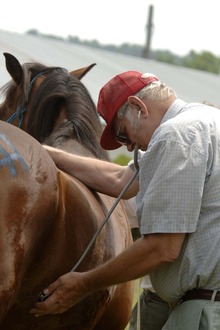Colic is the number one killer of horses (other than old age!) As a result, Equine Guelph is developing a new colic prevention program and we need your help!
Take the 15 - 20 minute survey! Your input and experience with colic is crucial in helping us better understand current colic management practices. This will assist us in developing important colic prevention programs.

Vet checking horse gut sounds
Horse colic survey will help Equine Guelph develop colic prevention program.
© 2012 by Carien Schippers
Participants of the survey are entered into a draw for a chance to WIN one of two registrations to Equine Guelph's upcoming Colic Prevention eWorkshop!
To reduce the risks of colic, horses should have regular access to pastures, both for grazing and for exercise. Horses with access to pastures are less likely to get colic than horses that are kept stabled more than 50% of the time.
A systematic, regular approach to feeding high quality hay and giving water before feeding grain is important to keep the horse's digestive system moving smoothly. Never feed a horse moldy hay or grain. Make any changes in diet and exercise level slowly to allow the horse to adjust to the changes.
